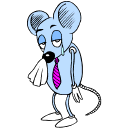 |
 |
SPOCA Review- the grammar of simple sentences and clauses
Task C - Our answer
 A
poisoned mouse who, still alive, is asking 'What have I done that you
wouldn't have?' stares quietly up at me. A
poisoned mouse who, still alive, is asking 'What have I done that you
wouldn't have?' stares quietly up at me.
You may have got a slightly different normal rearrangement, of course.
The disrupted grammar of the first part of the poem is effectively a
kind of grammatical symbolism - it helps to represent the disjointed,
uncomfortable effect on the persona of the poem, who has found the dying
mouse (which he, presumably, has poisoned). This helps to remind us of
the feelings of guilt we have if we kill pests in this way (note incidentally
how the mouse is anthropomorphised through the use of the personifying
pronoun 'who' instead of 'that' and the fact that the mouse is presented
as asking a rhetorical question of the persona which equates the mouse
and the persona).
The last three lines of the poem are not grammatically disrupted, however.
So we can see the force of the mouse's rhetorical question straightforwardly,
and thus sympathise with its viewpoint. Note that in our normalisation
of the grammar of the poem above, the mouse's words do not occupy the
final part of the sentence, making the contrast between the two parts
less easy to see. The fact that the poem is in the present tense helps
make the situation seem more dramatic and vivid. There are other things
that could be said about the poem at other linguistic levels (e.g. the
effect of the capitalisation of the first letter of 'Stares'), but it
should be clear that much pf the poem's force comes about because of the
grammatical disruption which we to some degree 're-cast' in our struggle
to come to terms with it.

|

